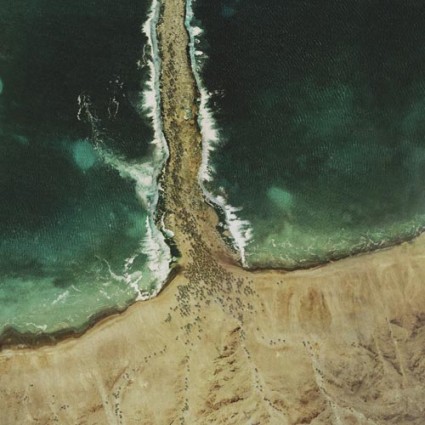|
 The
parting of the
Red Sea and the subsequent escape of thousands of Jewish slaves,
which is described in the Bible's book of Exodus, can be
explained by science, according to two Russian researchers. The
parting of the
Red Sea and the subsequent escape of thousands of Jewish slaves,
which is described in the Bible's book of Exodus, can be
explained by science, according to two Russian researchers.
The study, published in the Bulletin of the Russian Academy
of Sciences, is one of the first to examine the event using
oceanography, weather patterns, and mathematical calculations.
Naum Volzinger, senior researcher at the St. Petersburg
Institute of Oceanology, and colleague Alexei Androsov of
Hamburg,
determined that a reef runs from
Egypt
to the north side of the
Red Sea.
They believe the reef used to be much closer to the surface
during Biblical times at approximately 1500 B.C.
Depending on the weather and tidal movements, the reef could
have been exposed for hours at a time, according to the new
theory.
"If the
wind blew all night at a speed of 30 meters (about 98 1/2 feet)
per second, then the reef would be dry," Volzinger told The
Moscow Times. "It would take the Jews — there were 600,000
of them — four hours to cross the seven-kilometer (4.4 mile)
reef that runs from one coast to another. Then, in half an hour,
the waters would come back."
The
theory provides a scientific explanation for the story of the
Red Sea parting, which is credited to Moses and Jehovah in the
Bible.
"And
Moses stretched out his hand over the sea; and Jehovah caused
the sea to go back by a strong east wind all the night, and made
the sea dry land, and the waters were divided. And the children
of Israel went into the midst of the sea upon the dry ground:
and the waters were a wall unto them on their right hand, and on
their left." (Exodus 14:21-22).
Discovery News contacted three Biblical scholars about the
Russian study, and each expressed disappointment with the
findings.
Robert
Coote, professor of Old Testament studies at the San Francisco
Theological Seminary, said the language used to write the book
of Exodus, Hebrew Yam Sup, can be interpreted in different ways.
Coote indicated that the "Red Sea" might actually have been the
Mediterranean, a Suez lagoon, the Gulf of Suez, or the Gulf of
Aqaba.
Aaron
Brody, assistant professor of Bible and archaeology and director
of the Bade Museum at the Pacific School of Religion, agreed
with Coote and added, "There are no extra-biblical historic
texts that pertain to the Exodus story, and short-term events
like the one described in the Book of Exodus very rarely appear
in the archaeological record, so we have no textual sources
outside of the material in Genesis and no artifactual data to
clarify this event."
Along
with Coote and Brody, Barbara Green, professor of Biblical
studies at the Dominican School of Philosophy and Theology,
believes history and science provide important tools for
studying the Bible, but that they should not be the only ones.
"The
Bible needs to be read with many lenses, among which are history
and science, but there are many others as well," Green told
Discovery News. "The error is to assume that all that is at
stake is facticity — how many miles, how much speed. It is
ludicrous on its own."
http://dsc.discovery.com/news/briefs/20040202/redsea.html
Istanbul, February 07th 2003
http://gulizk.com
|